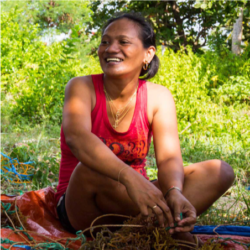On Caringo Island, Women Rule the Guardhouse
Fishers were breaking the rules. So, Susan changed the norm.
 On Caringo, a small island in Mercedes, Philippines, Susan Aceron leads the Caringo Women’s Group, eight women spearheading conservation and alternative livelihoods on the island and re-envisioning gender roles within a fishing community. As Caringo’s deputy fish warden—a title previously reserved for men—Susan and the Caringo Women’s Group are setting new norms in motion.
On Caringo, a small island in Mercedes, Philippines, Susan Aceron leads the Caringo Women’s Group, eight women spearheading conservation and alternative livelihoods on the island and re-envisioning gender roles within a fishing community. As Caringo’s deputy fish warden—a title previously reserved for men—Susan and the Caringo Women’s Group are setting new norms in motion.
The environment is important to us all
Aceron says.
Coastal fishing is a way of life on Caringo Island. In 2010, the community established a marine protected area (MPA) in its coastal waters to protect rich ecosystems like coral reefs and mangroves, and provide fish populations around Caringo room to breed and rebound. But fishers were not respecting the MPA’s boundaries, and it began to succumb to overfishing and illegal fishing practices. Fishers would enter its waters, more out of desperation than overzealousness, despite the risk of being reported and facing legal consequences. These intrusions threatened the Caringo Women’s Group’s families’ key source of food and income.
Susan and the Women’s Group decided to do something about it.
Spurred by their deep-rooted commitment to protecting their natural resources and livelihoods, they built a guardhouse to protect Caringo’s MPA. Their command of the guardhouse is unusual among the Philippines’ coastal communities, where fishing and MPA management is traditionally dominated by men. Despite tradition, Susan and individual group members stand guard, patrolling, enforcing, and cleaning up the shore every day from 8:00 AM to 5:00 PM.
“It’s difficult for us not to take care of our environment and MPA. If we don’t preserve our environment, our children and generations to follow will have nothing to sustain themselves in the future,” says Aceron.
Changing Norms
The women have caught countless intruders. They try to explain to each why they are enforcing the rules, and that while staying out may seem hard now, the fishers will be happy when the fish grow, and the fishermen get a bountiful harvest.
Propelled by their achievements, they are partnering with Rare to expand their conservation ethic beyond Caringo and bring MPA protections and fishers’ rights to more communities. They are also exploring sustainable livelihoods outside of fishing, like collecting and selling seaweed, to diversify their families’ income.
By venturing into uncharted waters, Susan and the Caringo Women’s Group are igniting change for people and nature—but they can’t do it alone. Will you help ignite change? GIVE NOW
Change is what Rare does best.
Now, we must work to elevate community behavior change to the scale of our global environmental challenges. Will you join us?
Help us ignite The change